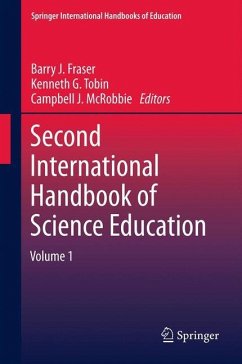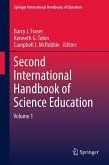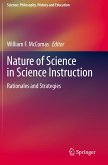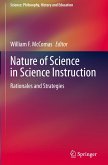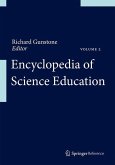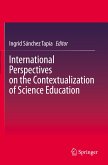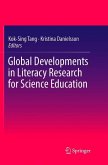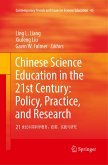Second International Handbook of Science Education
Herausgeber: Fraser, Barry J.; Tobin, Kenneth; McRobbie, Campbell J.
Second International Handbook of Science Education
Herausgeber: Fraser, Barry J.; Tobin, Kenneth; McRobbie, Campbell J.
- Broschiertes Buch
- Merkliste
- Auf die Merkliste
- Bewerten Bewerten
- Teilen
- Produkt teilen
- Produkterinnerung
- Produkterinnerung
The International Handbook of Science Education is a two volume edition pertaining to the most significant issues in science education. It is a follow-up to the first Handbook, published in 1998, which is seen as the most authoritative resource ever produced in science education. The chapters in this edition are reviews of research in science education and retain the strong international flavor of the project. It covers the diverse theories and methods that have been a foundation for science education and continue to characterize this field. Each section contains a lead chapter that provides…mehr
Andere Kunden interessierten sich auch für
![Second International Handbook of Science Education Second International Handbook of Science Education]() Barry J. Fraser / Kenneth Tobin / Campbell McRobbie (Hrsg.)Second International Handbook of Science Education416,99 €
Barry J. Fraser / Kenneth Tobin / Campbell McRobbie (Hrsg.)Second International Handbook of Science Education416,99 €![Nature of Science in Science Instruction Nature of Science in Science Instruction]() Nature of Science in Science Instruction117,99 €
Nature of Science in Science Instruction117,99 €![Nature of Science in Science Instruction Nature of Science in Science Instruction]() Nature of Science in Science Instruction192,59 €
Nature of Science in Science Instruction192,59 €![Encyclopedia of Science Education Encyclopedia of Science Education]() Encyclopedia of Science Education458,99 €
Encyclopedia of Science Education458,99 €![International Perspectives on the Contextualization of Science Education International Perspectives on the Contextualization of Science Education]() International Perspectives on the Contextualization of Science Education74,99 €
International Perspectives on the Contextualization of Science Education74,99 €![Global Developments in Literacy Research for Science Education Global Developments in Literacy Research for Science Education]() Global Developments in Literacy Research for Science Education110,99 €
Global Developments in Literacy Research for Science Education110,99 €![Chinese Science Education in the 21st Century: Policy, Practice, and Research Chinese Science Education in the 21st Century: Policy, Practice, and Research]() Chinese Science Education in the 21st Century: Policy, Practice, and Research111,99 €
Chinese Science Education in the 21st Century: Policy, Practice, and Research111,99 €-
-
-
The International Handbook of Science Education is a two volume edition pertaining to the most significant issues in science education. It is a follow-up to the first Handbook, published in 1998, which is seen as the most authoritative resource ever produced in science education. The chapters in this edition are reviews of research in science education and retain the strong international flavor of the project. It covers the diverse theories and methods that have been a foundation for science education and continue to characterize this field. Each section contains a lead chapter that provides an overview and synthesis of the field and related chapters that provide a narrower focus on research and current thinking on the key issues in that field. Leading researchers from around the world have participated as authors and consultants to produce a resource that is comprehensive, detailed and up to date. The chapters provide the most recent and advanced thinking in science education making the Handbook again the most authoritative resource in science education.
Hinweis: Dieser Artikel kann nur an eine deutsche Lieferadresse ausgeliefert werden.
Hinweis: Dieser Artikel kann nur an eine deutsche Lieferadresse ausgeliefert werden.
Produktdetails
- Produktdetails
- Springer International Handbooks of Education Nr.24
- Verlag: Springer Netherland / Springer Netherlands
- Softcover reprint of the original 1st ed. 2012
- Seitenzahl: 1604
- Erscheinungstermin: 23. August 2016
- Englisch
- Abmessung: 235mm x 155mm x 86mm
- Gewicht: 2383g
- ISBN-13: 9789402404951
- ISBN-10: 9402404953
- Artikelnr.: 48939215
- Herstellerkennzeichnung Die Herstellerinformationen sind derzeit nicht verfügbar.
- Springer International Handbooks of Education Nr.24
- Verlag: Springer Netherland / Springer Netherlands
- Softcover reprint of the original 1st ed. 2012
- Seitenzahl: 1604
- Erscheinungstermin: 23. August 2016
- Englisch
- Abmessung: 235mm x 155mm x 86mm
- Gewicht: 2383g
- ISBN-13: 9789402404951
- ISBN-10: 9402404953
- Artikelnr.: 48939215
- Herstellerkennzeichnung Die Herstellerinformationen sind derzeit nicht verfügbar.
Barry Fraser is John Curtin Distinguished Professor, Director of the Science and Mathematics Education Centre, and Dean of Graduate Studies in the Faculty of Science and Engineering at Curtin University. He is responsible for the world's largest graduate program in science and mathematics education and a Fellow of six learned academies/associations. His research interests include learning environments, educational evaluation and science education. He is the founding Editor of Springer's Learning Environments Research: An International Journal . Kenneth Tobin is Presidential Professor of Urban Education at the Graduate Center of the City University of New York. Prior to becoming a university science educator in Australia in 1974, he taught high school physics, chemistry, biology general science and mathematics for 10 years. He began a program of research in 1973 that continues to the present day-teaching and learning of science and learning to teach science. His current research focuses on the teaching and learning of science in urban schools in New York City. He is the founding Co-editor of Springer's Cultural Studies of Science Education . Campbell McRobbie is Emeritus Professor and former Director of the Centre for Mathematics and Science Education at Queensland University of Technology. He has an extensive research background in education, focusing on learning environments in science, students' conceptions of science, and design and technology education. He was editor of Springer's Research in Science Education in its formative years as an international journal.
PART ONE Preface Section 1: Sociocultural Perspectives and Urban
Education KENNETH TOBIN1.1 Sociocultural Perspectives on
Science Education STACY OLITSKY & CATHERINE MILNE1.2
Understanding Engagement in Science Education: The Psychological and the
Social YEW-JIN LEE1.3 Identity-Based Research in Science
Education JRÈNE RAHM1.4 Diverse Urban Youth's Learning
of Science Outside School in University Outreach and Community Science
Programs CHRISTOPHER EMDIN1.5 Reality Pedagogy and Urban
Science Education: Toward a Comprehensive Understanding of the Urban
Science Classroom DONNA KING & STEPHEN M. RITCHIE1.6
Learning Science Through Real-World Contexts ROWHEA
ELMESKY1.7 Collaborative Research Models for Transforming Teaching
and Learning Experiences MARIA VARELAS, JUSTINE M. KANE, ELI
TUCKER-RAYMOND & CHRISTINE C. PAPPAS1.8 Science Learning in Urban
Elementary School Classrooms: Liberatory Education and Issues of Access,
Participation and Achievement Section 2: Learning and Conceptual
Change REINDERS DUIT & DAVID F. TREAGUST2.1 How Can
Conceptual Change Contribute to Theory and Practice in Science
Education? STELLA VOSNIADOU2.2 Reframing the Classical
Approach to Conceptual Change: Preconceptions, Misconceptions and Synthetic
Models GREGORY P. THOMAS2.3 Metacognition in Science
Education: Past, Present and Future Considerations BRUCE
WALDRIP & VAUGHAN PRAIN2.4 Learning From and Through Representations
in Science LYNN STEPHENS & JOHN J. CLEMENT2.5 The Role
of Thought Experiments in Science and Science Learning COLETTE
MURPHY2.6 Vygotsky and Primary Science AVI HOFSTEIN &
PER M. KIND2.7 Learning In and From Science Laboratories
URI ZOLLER & TAMI LEVY NAHUM2.8 From Teaching to KNOW to Learning to
THINK in Science Education EDUARDO F. MORTIMER, PHIL SCOTT &
CHARBEL N. EL-HANI2.9 The Heterogeneity of Discourse in Science
Classrooms: The Conceptual Profile Approach KNUT NEUMANN,
ALEXANDER KAUERTZ & HANS E. FISCHER2.10 Quality of Instruction in
Science Education FANG-YING YANG & CHIN-CHUNG TSAI2.11
Personal Epistemology and Science Learning: A Review of Empirical
Studies GREGORY J. KELLY, SCOTT MCDONALD & PER-OLOF
WICKMAN2.12 Science Learning and Epistemology Section 3: Teacher
Education and Professional Development JOHN WALLACE & JOHN
LOUGHRAN3.1 Science Teacher Learning SHIRLEY SIMON &
SANDRA CAMPBELL3.2 Teacher Learning and Professional Development in
Science Education PAULINE W.U. CHINN3.3 Developing
Teachers' Place-Based and Culture-Based Pedagogical Content Knowledge and
Agency NORMAN G. LEDERMAN & JUDITH S. LEDERMAN3.4 Nature
of Scientific Knowledge and Scientific Inquiry: Building Instructional
Capacity Through Professional Development THOMAS KOBALLA, JR.
& LESLIE U. BRADBURY3.5 Mentoring in Support of Reform-Based Science
Teaching PETER C. TAYLOR, ELISABETH SETTELMAIER & BAL CHANDRA
LUITEL3.6 Multi-Paradigmatic Transformative Research as/for Teacher
Education: An Integral Perspective JULIE A. BIANCHINI3.7
Teaching While Still Learning to Teach: Beginning Science Teachers' Views,
Experiences and Classroom Practices AMANDA BERRY & JOHN
LOUGHRAN3.8 Developing Science Teacher Educators' Pedagogy of Teacher
Education SONYA N. MARTIN & CHRISTINA SIRY3.9 Using
Video in Science Teacher Education: An Analysis of the Utlilization of
Video-Based Media by Teacher Educators and Researchers HANS E.
FISCHER, ANDREAS BOROWSKI & OLIVER TEPNER3.10 Professional Knowledge of
Science Teachers JALE CAKIROGLU, YESIM CAPA AYDIN & ANITA
WOOLFOLK HOY3.11 Science Teaching Efficacy Beliefs JAMES
J. GALLAGHER, ROBERT E. FLODEN & YOVITA GWEKWERERE3.12 Context for
Developing Leadership in Science and Mathematics Education in the United
States LYNN A. BRYAN3.13 Research on Science Teacher
Beliefs Section 4: Equity and Social Justice KATHRYN
SCANTLEBURY4.1 Still Part of the Conversation: Gender Issues in
Science Education ADRIANE SLATON & ANGELA CALABRESE
BARTON4.2 Respect and Science Learning DEBRA
PANIZZON4.3 Science Education in Rural Settings: Exploring the 'State
of Play' Internationally ELIZABETH MCKINLEY & GEORGINA
STEWART4.4 Out of Place: Indigenous Knowledge in the Science
Curriculum KATHERINE RICHARDSON BRUNA4.5 On Knowing and
US Mexican Youth: Bordering Science Education Research, Practice and
Policy EILEEN CARLTON PARSONS, JAMES COOPER & JAMILA SMITH
SIMPSON4.6 Science Education Research Involving Blacks in the United
Sates during 1997-2007: Synthesis, Critique and Recommendations
MARIA S. RIVERA MAULUCCI4.7 Social Justice Research in Science
Education: Methodologies, Positioning and Implications for Future
Research Section 5: Assessment and Evaluation RUSSELL TYTLER
& JONATHAN OSBORNE5.1 Student Attitudes and Aspirations Towards
Science KAREN KERR & COLETTE MURPHY5.2 Children's
Attitudes to Primary Science XIUFENG LIU5.3 Developing
Measurement Instruments for Science Education Research MANFRED
PRENZEL, TINA SEIDEL & MAREIKE KOBARG5.4 Science Teaching and
Learning: An International Comparative Perspective BRONWEN
COWIE5.5 Focusing on the Classroom: Assessment for
Learning IRIT SASSON & YEHUDIT J. DORI5.6 Transfer
Skills and Their Case-Based Assessment ALEXANDER KAUERTZ, KNUT
NEUMANN & HENDRIK HAERTIG5.7 Competence in Science
Education FRANCES LAWRENZ & CHRISOPHER DAVID
DESJARDINS5.8 Trends in Government-Funded Multi-Site K-12 Science
Program Evaluation PART TWO Section 6: Curriculum and Reform
GRADY VENVILLE, LÉONIE J. RENNIE & JOHN WALLACE6.1 Curriculum
Integration: Challenging the Assumption of School Science as Powerful
Knowledge CLARE CHRISTENSEN & PETER J. FENSHAM6.2 Risk,
Uncertainty and Complexity in Science Education RICHARD K.
COLL & NEIL TAYLOR6.3 An International Perspective on Science
Curriculum Development and Implementation DAVID FORTUS &
JOSEPH KRAJCIK6.4 Curriculum Coherence and Learning
Progressions TROY D. SADLER & VAILLE DAWSON6.5
Socio-Scientific Issues in Science Education: Contexts for the Promotion of
Key Learning Outcomes ALISTER JONES6.6 Technology in
Science Education: Context, Contestation and Connection APRIL
LUEHMANN & JEREMIAH FRINK6.7 Web 2.0 Technologies, New Media
Literacies and Science Education: Exploring the Potential to
Transform STEPHEN M. RITCHIE6.8 Leading the
Transformation of Learning and Praxis in Science Classrooms
SUSAN A. KIRCH6.9 Understanding Scientific Uncertainty as a Teaching
and Learning Goal MICHAEL P. MUELLER & DEBORAH TIPPINS6.10
Citizen Science, Ecojustice and Science Education: Rethinking and Education
from Nowhere HANNA J. ARZI6.11 Change - A Desired
Permanent State in Science Education LYN CARTER6.12
Globalisation and Science Education: Global Information Culture,
Postcolonialism and Sustainability SHARON J. LYNCH6.13
Metaphor and Theory for Scale-Up Research: Eagles in the Anacostia and
Activity Systems Section 7: Argumentation and Nature of
Science JONATHAN OSBORNE7.1 The Role of Argument:
Learning How to Learn in School Science CATHERINE
MILNE7.2 Beyond Argument in Science: Science Education as Connected
and Separate Knowing CHRISTINE V. MCDONALD & CAMPBELL J.
MCROBBIE7.3 Utilising Argumentation to Teach Nature of
Science DAVID GEELAN7.4 Teacher
Explanations MARÍA PILAR JIMÉNEZ-ALEIXANDRE & BLANCA
PUIG7.5 Argumentation, Evidence Evaluation and Critical
Thinking JOHN R. STAVER7.6 Constructivism and Realism:
Dueling Paradigms MICHIEL VAN EIJCK7.7 Capturing the
Dynamics of Science in Science Education FOUAD
ABD-EL-KHALICK7.8 Nature of Science in Science Education: Toward a
Coherent Framework for Synergistic Research and Development Section 8:
Out-of-School Learning JOHN H. FALK & LYNN D.
DIERKING8.1 Lifelong Science Learning for Adults: The Role of
Free-Choice Experiences JUSTIN DILLON8.2 Science, the
Environment and Education Beyond the Classroom J. RANDY
MCGINNIS, EMILY HESTNESS, KELLY RIEDINGER, PHYLLIS KATZ, GILI MARBACH-AD &
AMY DAI8.3 Informal Science Education in Formal Science Teacher
Preparation TALI TAL8.4 Out-of-School: Learning
Experiences, Teaching and Students' Learning PETER AUBUSSON,
JANETTE GRIFFIN & MATTHEW KEARNEY8.5 Learning Beyond the Classroom:
Implications for School Science KOSHI DHINGRA8.6 Science
Stories on Television PREETI GUPTA & JENNIFER D.
ADAMS8.7 Museum-University Partnerships for Preservice Science
Education JENNIFER D. ADAMS8.8 Community Science:
Capitalizing on Local Ways of Enacting Science in Science
Education DAVID ANDERSON & KIRSTEN M. ELLENBOGEN8.9
Learning Science in Informal Contexts - Epistemological Perspectives and
Paradigms Section 9: Learning Environments BARRY J.
FRASER9.1 Classroom Learning Environments: Retrospect, Context and
Prospect THEO WUBBELS & MIEKE BREKELMANS9.2
Teacher-Students Relationships in the Classroom JILL M.
ALDRIDGE9.3 Outcomes-Focused Learning Environments DAVID
B. ZANDVLIET9.4 ICT Learning Environments and Science Education:
Perception to Practice REBEKAH K. NIX9.5 Cultivating
Constructivist Classrooms through Evaluation of an Integrated Science
Learning Environment CATHERINE MARTIN-DUNLOP & BARRY J.
FRASER9.6 Using a Learning Environment Perspective in Evaluating an
Innovative Science Course for Prospective Elementary Teachers
DONNA DEGENNARO9.7 Evolving Learning Designs and Emerging
Technologies JEFFREY P. DORMAN9.8 The Impact of Student
Clustering on the Results of Statistical Tests Section 10: Literacy and
Language NANCY R. ROMANCE & MICHAEL R. VITALE10.1
Interdisciplinary Perspectives Linking Science and Literacy in Grades K-5:
Implications for Policy and Practice BRIAN HAND & VAUGHAN
PRAIN10.2 Writing as a Learning Tool in Science: Lessons Learnt and
Future Agendas MARIONA ESPINET, MERCÈ IZQUIERDO, JOSEP BONIL &
S. LIZETTE RAMOS DE ROBLES10.3 The Role of Languages in Modeling the
Natural World: Perspectives in Science Education WILLIAM G.
HOLLIDAY & STEPHEN D. CAIN10.4 Teaching Science Reading Comprehension:
A Realistic, Research-Based Approach RANDY K. YERRICK, ANNA M.
LIUZZO & JANINA BRUTT-GRIFFLER10.5 Building Common Language,
Experiences and Learning Spaces with Lower-Track Science
Students PEI-LING HSU & WOLFF-MICHAEL ROTH10.6
Understanding Beliefs, Identity, Conceptions and Motivations from a
Discursive Psychology Perspective Section 11: Research
Methods FREDERICK ERICKSON11.1 Qualitative Research
Methods for Science Education JAY L. LEMKE11.2 Analysing
Verbal Data: Principals, Methods and Problems SHIRLEY R.
STEINBERG & JOE L. KINCHELOE11.3 Employing the Bricolage as Critical
Research in Science Education WOLFF-MICHAEL ROTH & PEI-LING
HSU11.4 Analyzing Verbal Data: An Object Lesson
Education KENNETH TOBIN1.1 Sociocultural Perspectives on
Science Education STACY OLITSKY & CATHERINE MILNE1.2
Understanding Engagement in Science Education: The Psychological and the
Social YEW-JIN LEE1.3 Identity-Based Research in Science
Education JRÈNE RAHM1.4 Diverse Urban Youth's Learning
of Science Outside School in University Outreach and Community Science
Programs CHRISTOPHER EMDIN1.5 Reality Pedagogy and Urban
Science Education: Toward a Comprehensive Understanding of the Urban
Science Classroom DONNA KING & STEPHEN M. RITCHIE1.6
Learning Science Through Real-World Contexts ROWHEA
ELMESKY1.7 Collaborative Research Models for Transforming Teaching
and Learning Experiences MARIA VARELAS, JUSTINE M. KANE, ELI
TUCKER-RAYMOND & CHRISTINE C. PAPPAS1.8 Science Learning in Urban
Elementary School Classrooms: Liberatory Education and Issues of Access,
Participation and Achievement Section 2: Learning and Conceptual
Change REINDERS DUIT & DAVID F. TREAGUST2.1 How Can
Conceptual Change Contribute to Theory and Practice in Science
Education? STELLA VOSNIADOU2.2 Reframing the Classical
Approach to Conceptual Change: Preconceptions, Misconceptions and Synthetic
Models GREGORY P. THOMAS2.3 Metacognition in Science
Education: Past, Present and Future Considerations BRUCE
WALDRIP & VAUGHAN PRAIN2.4 Learning From and Through Representations
in Science LYNN STEPHENS & JOHN J. CLEMENT2.5 The Role
of Thought Experiments in Science and Science Learning COLETTE
MURPHY2.6 Vygotsky and Primary Science AVI HOFSTEIN &
PER M. KIND2.7 Learning In and From Science Laboratories
URI ZOLLER & TAMI LEVY NAHUM2.8 From Teaching to KNOW to Learning to
THINK in Science Education EDUARDO F. MORTIMER, PHIL SCOTT &
CHARBEL N. EL-HANI2.9 The Heterogeneity of Discourse in Science
Classrooms: The Conceptual Profile Approach KNUT NEUMANN,
ALEXANDER KAUERTZ & HANS E. FISCHER2.10 Quality of Instruction in
Science Education FANG-YING YANG & CHIN-CHUNG TSAI2.11
Personal Epistemology and Science Learning: A Review of Empirical
Studies GREGORY J. KELLY, SCOTT MCDONALD & PER-OLOF
WICKMAN2.12 Science Learning and Epistemology Section 3: Teacher
Education and Professional Development JOHN WALLACE & JOHN
LOUGHRAN3.1 Science Teacher Learning SHIRLEY SIMON &
SANDRA CAMPBELL3.2 Teacher Learning and Professional Development in
Science Education PAULINE W.U. CHINN3.3 Developing
Teachers' Place-Based and Culture-Based Pedagogical Content Knowledge and
Agency NORMAN G. LEDERMAN & JUDITH S. LEDERMAN3.4 Nature
of Scientific Knowledge and Scientific Inquiry: Building Instructional
Capacity Through Professional Development THOMAS KOBALLA, JR.
& LESLIE U. BRADBURY3.5 Mentoring in Support of Reform-Based Science
Teaching PETER C. TAYLOR, ELISABETH SETTELMAIER & BAL CHANDRA
LUITEL3.6 Multi-Paradigmatic Transformative Research as/for Teacher
Education: An Integral Perspective JULIE A. BIANCHINI3.7
Teaching While Still Learning to Teach: Beginning Science Teachers' Views,
Experiences and Classroom Practices AMANDA BERRY & JOHN
LOUGHRAN3.8 Developing Science Teacher Educators' Pedagogy of Teacher
Education SONYA N. MARTIN & CHRISTINA SIRY3.9 Using
Video in Science Teacher Education: An Analysis of the Utlilization of
Video-Based Media by Teacher Educators and Researchers HANS E.
FISCHER, ANDREAS BOROWSKI & OLIVER TEPNER3.10 Professional Knowledge of
Science Teachers JALE CAKIROGLU, YESIM CAPA AYDIN & ANITA
WOOLFOLK HOY3.11 Science Teaching Efficacy Beliefs JAMES
J. GALLAGHER, ROBERT E. FLODEN & YOVITA GWEKWERERE3.12 Context for
Developing Leadership in Science and Mathematics Education in the United
States LYNN A. BRYAN3.13 Research on Science Teacher
Beliefs Section 4: Equity and Social Justice KATHRYN
SCANTLEBURY4.1 Still Part of the Conversation: Gender Issues in
Science Education ADRIANE SLATON & ANGELA CALABRESE
BARTON4.2 Respect and Science Learning DEBRA
PANIZZON4.3 Science Education in Rural Settings: Exploring the 'State
of Play' Internationally ELIZABETH MCKINLEY & GEORGINA
STEWART4.4 Out of Place: Indigenous Knowledge in the Science
Curriculum KATHERINE RICHARDSON BRUNA4.5 On Knowing and
US Mexican Youth: Bordering Science Education Research, Practice and
Policy EILEEN CARLTON PARSONS, JAMES COOPER & JAMILA SMITH
SIMPSON4.6 Science Education Research Involving Blacks in the United
Sates during 1997-2007: Synthesis, Critique and Recommendations
MARIA S. RIVERA MAULUCCI4.7 Social Justice Research in Science
Education: Methodologies, Positioning and Implications for Future
Research Section 5: Assessment and Evaluation RUSSELL TYTLER
& JONATHAN OSBORNE5.1 Student Attitudes and Aspirations Towards
Science KAREN KERR & COLETTE MURPHY5.2 Children's
Attitudes to Primary Science XIUFENG LIU5.3 Developing
Measurement Instruments for Science Education Research MANFRED
PRENZEL, TINA SEIDEL & MAREIKE KOBARG5.4 Science Teaching and
Learning: An International Comparative Perspective BRONWEN
COWIE5.5 Focusing on the Classroom: Assessment for
Learning IRIT SASSON & YEHUDIT J. DORI5.6 Transfer
Skills and Their Case-Based Assessment ALEXANDER KAUERTZ, KNUT
NEUMANN & HENDRIK HAERTIG5.7 Competence in Science
Education FRANCES LAWRENZ & CHRISOPHER DAVID
DESJARDINS5.8 Trends in Government-Funded Multi-Site K-12 Science
Program Evaluation PART TWO Section 6: Curriculum and Reform
GRADY VENVILLE, LÉONIE J. RENNIE & JOHN WALLACE6.1 Curriculum
Integration: Challenging the Assumption of School Science as Powerful
Knowledge CLARE CHRISTENSEN & PETER J. FENSHAM6.2 Risk,
Uncertainty and Complexity in Science Education RICHARD K.
COLL & NEIL TAYLOR6.3 An International Perspective on Science
Curriculum Development and Implementation DAVID FORTUS &
JOSEPH KRAJCIK6.4 Curriculum Coherence and Learning
Progressions TROY D. SADLER & VAILLE DAWSON6.5
Socio-Scientific Issues in Science Education: Contexts for the Promotion of
Key Learning Outcomes ALISTER JONES6.6 Technology in
Science Education: Context, Contestation and Connection APRIL
LUEHMANN & JEREMIAH FRINK6.7 Web 2.0 Technologies, New Media
Literacies and Science Education: Exploring the Potential to
Transform STEPHEN M. RITCHIE6.8 Leading the
Transformation of Learning and Praxis in Science Classrooms
SUSAN A. KIRCH6.9 Understanding Scientific Uncertainty as a Teaching
and Learning Goal MICHAEL P. MUELLER & DEBORAH TIPPINS6.10
Citizen Science, Ecojustice and Science Education: Rethinking and Education
from Nowhere HANNA J. ARZI6.11 Change - A Desired
Permanent State in Science Education LYN CARTER6.12
Globalisation and Science Education: Global Information Culture,
Postcolonialism and Sustainability SHARON J. LYNCH6.13
Metaphor and Theory for Scale-Up Research: Eagles in the Anacostia and
Activity Systems Section 7: Argumentation and Nature of
Science JONATHAN OSBORNE7.1 The Role of Argument:
Learning How to Learn in School Science CATHERINE
MILNE7.2 Beyond Argument in Science: Science Education as Connected
and Separate Knowing CHRISTINE V. MCDONALD & CAMPBELL J.
MCROBBIE7.3 Utilising Argumentation to Teach Nature of
Science DAVID GEELAN7.4 Teacher
Explanations MARÍA PILAR JIMÉNEZ-ALEIXANDRE & BLANCA
PUIG7.5 Argumentation, Evidence Evaluation and Critical
Thinking JOHN R. STAVER7.6 Constructivism and Realism:
Dueling Paradigms MICHIEL VAN EIJCK7.7 Capturing the
Dynamics of Science in Science Education FOUAD
ABD-EL-KHALICK7.8 Nature of Science in Science Education: Toward a
Coherent Framework for Synergistic Research and Development Section 8:
Out-of-School Learning JOHN H. FALK & LYNN D.
DIERKING8.1 Lifelong Science Learning for Adults: The Role of
Free-Choice Experiences JUSTIN DILLON8.2 Science, the
Environment and Education Beyond the Classroom J. RANDY
MCGINNIS, EMILY HESTNESS, KELLY RIEDINGER, PHYLLIS KATZ, GILI MARBACH-AD &
AMY DAI8.3 Informal Science Education in Formal Science Teacher
Preparation TALI TAL8.4 Out-of-School: Learning
Experiences, Teaching and Students' Learning PETER AUBUSSON,
JANETTE GRIFFIN & MATTHEW KEARNEY8.5 Learning Beyond the Classroom:
Implications for School Science KOSHI DHINGRA8.6 Science
Stories on Television PREETI GUPTA & JENNIFER D.
ADAMS8.7 Museum-University Partnerships for Preservice Science
Education JENNIFER D. ADAMS8.8 Community Science:
Capitalizing on Local Ways of Enacting Science in Science
Education DAVID ANDERSON & KIRSTEN M. ELLENBOGEN8.9
Learning Science in Informal Contexts - Epistemological Perspectives and
Paradigms Section 9: Learning Environments BARRY J.
FRASER9.1 Classroom Learning Environments: Retrospect, Context and
Prospect THEO WUBBELS & MIEKE BREKELMANS9.2
Teacher-Students Relationships in the Classroom JILL M.
ALDRIDGE9.3 Outcomes-Focused Learning Environments DAVID
B. ZANDVLIET9.4 ICT Learning Environments and Science Education:
Perception to Practice REBEKAH K. NIX9.5 Cultivating
Constructivist Classrooms through Evaluation of an Integrated Science
Learning Environment CATHERINE MARTIN-DUNLOP & BARRY J.
FRASER9.6 Using a Learning Environment Perspective in Evaluating an
Innovative Science Course for Prospective Elementary Teachers
DONNA DEGENNARO9.7 Evolving Learning Designs and Emerging
Technologies JEFFREY P. DORMAN9.8 The Impact of Student
Clustering on the Results of Statistical Tests Section 10: Literacy and
Language NANCY R. ROMANCE & MICHAEL R. VITALE10.1
Interdisciplinary Perspectives Linking Science and Literacy in Grades K-5:
Implications for Policy and Practice BRIAN HAND & VAUGHAN
PRAIN10.2 Writing as a Learning Tool in Science: Lessons Learnt and
Future Agendas MARIONA ESPINET, MERCÈ IZQUIERDO, JOSEP BONIL &
S. LIZETTE RAMOS DE ROBLES10.3 The Role of Languages in Modeling the
Natural World: Perspectives in Science Education WILLIAM G.
HOLLIDAY & STEPHEN D. CAIN10.4 Teaching Science Reading Comprehension:
A Realistic, Research-Based Approach RANDY K. YERRICK, ANNA M.
LIUZZO & JANINA BRUTT-GRIFFLER10.5 Building Common Language,
Experiences and Learning Spaces with Lower-Track Science
Students PEI-LING HSU & WOLFF-MICHAEL ROTH10.6
Understanding Beliefs, Identity, Conceptions and Motivations from a
Discursive Psychology Perspective Section 11: Research
Methods FREDERICK ERICKSON11.1 Qualitative Research
Methods for Science Education JAY L. LEMKE11.2 Analysing
Verbal Data: Principals, Methods and Problems SHIRLEY R.
STEINBERG & JOE L. KINCHELOE11.3 Employing the Bricolage as Critical
Research in Science Education WOLFF-MICHAEL ROTH & PEI-LING
HSU11.4 Analyzing Verbal Data: An Object Lesson
PART ONE Preface Section 1: Sociocultural Perspectives and Urban
Education KENNETH TOBIN1.1 Sociocultural Perspectives on
Science Education STACY OLITSKY & CATHERINE MILNE1.2
Understanding Engagement in Science Education: The Psychological and the
Social YEW-JIN LEE1.3 Identity-Based Research in Science
Education JRÈNE RAHM1.4 Diverse Urban Youth's Learning
of Science Outside School in University Outreach and Community Science
Programs CHRISTOPHER EMDIN1.5 Reality Pedagogy and Urban
Science Education: Toward a Comprehensive Understanding of the Urban
Science Classroom DONNA KING & STEPHEN M. RITCHIE1.6
Learning Science Through Real-World Contexts ROWHEA
ELMESKY1.7 Collaborative Research Models for Transforming Teaching
and Learning Experiences MARIA VARELAS, JUSTINE M. KANE, ELI
TUCKER-RAYMOND & CHRISTINE C. PAPPAS1.8 Science Learning in Urban
Elementary School Classrooms: Liberatory Education and Issues of Access,
Participation and Achievement Section 2: Learning and Conceptual
Change REINDERS DUIT & DAVID F. TREAGUST2.1 How Can
Conceptual Change Contribute to Theory and Practice in Science
Education? STELLA VOSNIADOU2.2 Reframing the Classical
Approach to Conceptual Change: Preconceptions, Misconceptions and Synthetic
Models GREGORY P. THOMAS2.3 Metacognition in Science
Education: Past, Present and Future Considerations BRUCE
WALDRIP & VAUGHAN PRAIN2.4 Learning From and Through Representations
in Science LYNN STEPHENS & JOHN J. CLEMENT2.5 The Role
of Thought Experiments in Science and Science Learning COLETTE
MURPHY2.6 Vygotsky and Primary Science AVI HOFSTEIN &
PER M. KIND2.7 Learning In and From Science Laboratories
URI ZOLLER & TAMI LEVY NAHUM2.8 From Teaching to KNOW to Learning to
THINK in Science Education EDUARDO F. MORTIMER, PHIL SCOTT &
CHARBEL N. EL-HANI2.9 The Heterogeneity of Discourse in Science
Classrooms: The Conceptual Profile Approach KNUT NEUMANN,
ALEXANDER KAUERTZ & HANS E. FISCHER2.10 Quality of Instruction in
Science Education FANG-YING YANG & CHIN-CHUNG TSAI2.11
Personal Epistemology and Science Learning: A Review of Empirical
Studies GREGORY J. KELLY, SCOTT MCDONALD & PER-OLOF
WICKMAN2.12 Science Learning and Epistemology Section 3: Teacher
Education and Professional Development JOHN WALLACE & JOHN
LOUGHRAN3.1 Science Teacher Learning SHIRLEY SIMON &
SANDRA CAMPBELL3.2 Teacher Learning and Professional Development in
Science Education PAULINE W.U. CHINN3.3 Developing
Teachers' Place-Based and Culture-Based Pedagogical Content Knowledge and
Agency NORMAN G. LEDERMAN & JUDITH S. LEDERMAN3.4 Nature
of Scientific Knowledge and Scientific Inquiry: Building Instructional
Capacity Through Professional Development THOMAS KOBALLA, JR.
& LESLIE U. BRADBURY3.5 Mentoring in Support of Reform-Based Science
Teaching PETER C. TAYLOR, ELISABETH SETTELMAIER & BAL CHANDRA
LUITEL3.6 Multi-Paradigmatic Transformative Research as/for Teacher
Education: An Integral Perspective JULIE A. BIANCHINI3.7
Teaching While Still Learning to Teach: Beginning Science Teachers' Views,
Experiences and Classroom Practices AMANDA BERRY & JOHN
LOUGHRAN3.8 Developing Science Teacher Educators' Pedagogy of Teacher
Education SONYA N. MARTIN & CHRISTINA SIRY3.9 Using
Video in Science Teacher Education: An Analysis of the Utlilization of
Video-Based Media by Teacher Educators and Researchers HANS E.
FISCHER, ANDREAS BOROWSKI & OLIVER TEPNER3.10 Professional Knowledge of
Science Teachers JALE CAKIROGLU, YESIM CAPA AYDIN & ANITA
WOOLFOLK HOY3.11 Science Teaching Efficacy Beliefs JAMES
J. GALLAGHER, ROBERT E. FLODEN & YOVITA GWEKWERERE3.12 Context for
Developing Leadership in Science and Mathematics Education in the United
States LYNN A. BRYAN3.13 Research on Science Teacher
Beliefs Section 4: Equity and Social Justice KATHRYN
SCANTLEBURY4.1 Still Part of the Conversation: Gender Issues in
Science Education ADRIANE SLATON & ANGELA CALABRESE
BARTON4.2 Respect and Science Learning DEBRA
PANIZZON4.3 Science Education in Rural Settings: Exploring the 'State
of Play' Internationally ELIZABETH MCKINLEY & GEORGINA
STEWART4.4 Out of Place: Indigenous Knowledge in the Science
Curriculum KATHERINE RICHARDSON BRUNA4.5 On Knowing and
US Mexican Youth: Bordering Science Education Research, Practice and
Policy EILEEN CARLTON PARSONS, JAMES COOPER & JAMILA SMITH
SIMPSON4.6 Science Education Research Involving Blacks in the United
Sates during 1997-2007: Synthesis, Critique and Recommendations
MARIA S. RIVERA MAULUCCI4.7 Social Justice Research in Science
Education: Methodologies, Positioning and Implications for Future
Research Section 5: Assessment and Evaluation RUSSELL TYTLER
& JONATHAN OSBORNE5.1 Student Attitudes and Aspirations Towards
Science KAREN KERR & COLETTE MURPHY5.2 Children's
Attitudes to Primary Science XIUFENG LIU5.3 Developing
Measurement Instruments for Science Education Research MANFRED
PRENZEL, TINA SEIDEL & MAREIKE KOBARG5.4 Science Teaching and
Learning: An International Comparative Perspective BRONWEN
COWIE5.5 Focusing on the Classroom: Assessment for
Learning IRIT SASSON & YEHUDIT J. DORI5.6 Transfer
Skills and Their Case-Based Assessment ALEXANDER KAUERTZ, KNUT
NEUMANN & HENDRIK HAERTIG5.7 Competence in Science
Education FRANCES LAWRENZ & CHRISOPHER DAVID
DESJARDINS5.8 Trends in Government-Funded Multi-Site K-12 Science
Program Evaluation PART TWO Section 6: Curriculum and Reform
GRADY VENVILLE, LÉONIE J. RENNIE & JOHN WALLACE6.1 Curriculum
Integration: Challenging the Assumption of School Science as Powerful
Knowledge CLARE CHRISTENSEN & PETER J. FENSHAM6.2 Risk,
Uncertainty and Complexity in Science Education RICHARD K.
COLL & NEIL TAYLOR6.3 An International Perspective on Science
Curriculum Development and Implementation DAVID FORTUS &
JOSEPH KRAJCIK6.4 Curriculum Coherence and Learning
Progressions TROY D. SADLER & VAILLE DAWSON6.5
Socio-Scientific Issues in Science Education: Contexts for the Promotion of
Key Learning Outcomes ALISTER JONES6.6 Technology in
Science Education: Context, Contestation and Connection APRIL
LUEHMANN & JEREMIAH FRINK6.7 Web 2.0 Technologies, New Media
Literacies and Science Education: Exploring the Potential to
Transform STEPHEN M. RITCHIE6.8 Leading the
Transformation of Learning and Praxis in Science Classrooms
SUSAN A. KIRCH6.9 Understanding Scientific Uncertainty as a Teaching
and Learning Goal MICHAEL P. MUELLER & DEBORAH TIPPINS6.10
Citizen Science, Ecojustice and Science Education: Rethinking and Education
from Nowhere HANNA J. ARZI6.11 Change - A Desired
Permanent State in Science Education LYN CARTER6.12
Globalisation and Science Education: Global Information Culture,
Postcolonialism and Sustainability SHARON J. LYNCH6.13
Metaphor and Theory for Scale-Up Research: Eagles in the Anacostia and
Activity Systems Section 7: Argumentation and Nature of
Science JONATHAN OSBORNE7.1 The Role of Argument:
Learning How to Learn in School Science CATHERINE
MILNE7.2 Beyond Argument in Science: Science Education as Connected
and Separate Knowing CHRISTINE V. MCDONALD & CAMPBELL J.
MCROBBIE7.3 Utilising Argumentation to Teach Nature of
Science DAVID GEELAN7.4 Teacher
Explanations MARÍA PILAR JIMÉNEZ-ALEIXANDRE & BLANCA
PUIG7.5 Argumentation, Evidence Evaluation and Critical
Thinking JOHN R. STAVER7.6 Constructivism and Realism:
Dueling Paradigms MICHIEL VAN EIJCK7.7 Capturing the
Dynamics of Science in Science Education FOUAD
ABD-EL-KHALICK7.8 Nature of Science in Science Education: Toward a
Coherent Framework for Synergistic Research and Development Section 8:
Out-of-School Learning JOHN H. FALK & LYNN D.
DIERKING8.1 Lifelong Science Learning for Adults: The Role of
Free-Choice Experiences JUSTIN DILLON8.2 Science, the
Environment and Education Beyond the Classroom J. RANDY
MCGINNIS, EMILY HESTNESS, KELLY RIEDINGER, PHYLLIS KATZ, GILI MARBACH-AD &
AMY DAI8.3 Informal Science Education in Formal Science Teacher
Preparation TALI TAL8.4 Out-of-School: Learning
Experiences, Teaching and Students' Learning PETER AUBUSSON,
JANETTE GRIFFIN & MATTHEW KEARNEY8.5 Learning Beyond the Classroom:
Implications for School Science KOSHI DHINGRA8.6 Science
Stories on Television PREETI GUPTA & JENNIFER D.
ADAMS8.7 Museum-University Partnerships for Preservice Science
Education JENNIFER D. ADAMS8.8 Community Science:
Capitalizing on Local Ways of Enacting Science in Science
Education DAVID ANDERSON & KIRSTEN M. ELLENBOGEN8.9
Learning Science in Informal Contexts - Epistemological Perspectives and
Paradigms Section 9: Learning Environments BARRY J.
FRASER9.1 Classroom Learning Environments: Retrospect, Context and
Prospect THEO WUBBELS & MIEKE BREKELMANS9.2
Teacher-Students Relationships in the Classroom JILL M.
ALDRIDGE9.3 Outcomes-Focused Learning Environments DAVID
B. ZANDVLIET9.4 ICT Learning Environments and Science Education:
Perception to Practice REBEKAH K. NIX9.5 Cultivating
Constructivist Classrooms through Evaluation of an Integrated Science
Learning Environment CATHERINE MARTIN-DUNLOP & BARRY J.
FRASER9.6 Using a Learning Environment Perspective in Evaluating an
Innovative Science Course for Prospective Elementary Teachers
DONNA DEGENNARO9.7 Evolving Learning Designs and Emerging
Technologies JEFFREY P. DORMAN9.8 The Impact of Student
Clustering on the Results of Statistical Tests Section 10: Literacy and
Language NANCY R. ROMANCE & MICHAEL R. VITALE10.1
Interdisciplinary Perspectives Linking Science and Literacy in Grades K-5:
Implications for Policy and Practice BRIAN HAND & VAUGHAN
PRAIN10.2 Writing as a Learning Tool in Science: Lessons Learnt and
Future Agendas MARIONA ESPINET, MERCÈ IZQUIERDO, JOSEP BONIL &
S. LIZETTE RAMOS DE ROBLES10.3 The Role of Languages in Modeling the
Natural World: Perspectives in Science Education WILLIAM G.
HOLLIDAY & STEPHEN D. CAIN10.4 Teaching Science Reading Comprehension:
A Realistic, Research-Based Approach RANDY K. YERRICK, ANNA M.
LIUZZO & JANINA BRUTT-GRIFFLER10.5 Building Common Language,
Experiences and Learning Spaces with Lower-Track Science
Students PEI-LING HSU & WOLFF-MICHAEL ROTH10.6
Understanding Beliefs, Identity, Conceptions and Motivations from a
Discursive Psychology Perspective Section 11: Research
Methods FREDERICK ERICKSON11.1 Qualitative Research
Methods for Science Education JAY L. LEMKE11.2 Analysing
Verbal Data: Principals, Methods and Problems SHIRLEY R.
STEINBERG & JOE L. KINCHELOE11.3 Employing the Bricolage as Critical
Research in Science Education WOLFF-MICHAEL ROTH & PEI-LING
HSU11.4 Analyzing Verbal Data: An Object Lesson
Education KENNETH TOBIN1.1 Sociocultural Perspectives on
Science Education STACY OLITSKY & CATHERINE MILNE1.2
Understanding Engagement in Science Education: The Psychological and the
Social YEW-JIN LEE1.3 Identity-Based Research in Science
Education JRÈNE RAHM1.4 Diverse Urban Youth's Learning
of Science Outside School in University Outreach and Community Science
Programs CHRISTOPHER EMDIN1.5 Reality Pedagogy and Urban
Science Education: Toward a Comprehensive Understanding of the Urban
Science Classroom DONNA KING & STEPHEN M. RITCHIE1.6
Learning Science Through Real-World Contexts ROWHEA
ELMESKY1.7 Collaborative Research Models for Transforming Teaching
and Learning Experiences MARIA VARELAS, JUSTINE M. KANE, ELI
TUCKER-RAYMOND & CHRISTINE C. PAPPAS1.8 Science Learning in Urban
Elementary School Classrooms: Liberatory Education and Issues of Access,
Participation and Achievement Section 2: Learning and Conceptual
Change REINDERS DUIT & DAVID F. TREAGUST2.1 How Can
Conceptual Change Contribute to Theory and Practice in Science
Education? STELLA VOSNIADOU2.2 Reframing the Classical
Approach to Conceptual Change: Preconceptions, Misconceptions and Synthetic
Models GREGORY P. THOMAS2.3 Metacognition in Science
Education: Past, Present and Future Considerations BRUCE
WALDRIP & VAUGHAN PRAIN2.4 Learning From and Through Representations
in Science LYNN STEPHENS & JOHN J. CLEMENT2.5 The Role
of Thought Experiments in Science and Science Learning COLETTE
MURPHY2.6 Vygotsky and Primary Science AVI HOFSTEIN &
PER M. KIND2.7 Learning In and From Science Laboratories
URI ZOLLER & TAMI LEVY NAHUM2.8 From Teaching to KNOW to Learning to
THINK in Science Education EDUARDO F. MORTIMER, PHIL SCOTT &
CHARBEL N. EL-HANI2.9 The Heterogeneity of Discourse in Science
Classrooms: The Conceptual Profile Approach KNUT NEUMANN,
ALEXANDER KAUERTZ & HANS E. FISCHER2.10 Quality of Instruction in
Science Education FANG-YING YANG & CHIN-CHUNG TSAI2.11
Personal Epistemology and Science Learning: A Review of Empirical
Studies GREGORY J. KELLY, SCOTT MCDONALD & PER-OLOF
WICKMAN2.12 Science Learning and Epistemology Section 3: Teacher
Education and Professional Development JOHN WALLACE & JOHN
LOUGHRAN3.1 Science Teacher Learning SHIRLEY SIMON &
SANDRA CAMPBELL3.2 Teacher Learning and Professional Development in
Science Education PAULINE W.U. CHINN3.3 Developing
Teachers' Place-Based and Culture-Based Pedagogical Content Knowledge and
Agency NORMAN G. LEDERMAN & JUDITH S. LEDERMAN3.4 Nature
of Scientific Knowledge and Scientific Inquiry: Building Instructional
Capacity Through Professional Development THOMAS KOBALLA, JR.
& LESLIE U. BRADBURY3.5 Mentoring in Support of Reform-Based Science
Teaching PETER C. TAYLOR, ELISABETH SETTELMAIER & BAL CHANDRA
LUITEL3.6 Multi-Paradigmatic Transformative Research as/for Teacher
Education: An Integral Perspective JULIE A. BIANCHINI3.7
Teaching While Still Learning to Teach: Beginning Science Teachers' Views,
Experiences and Classroom Practices AMANDA BERRY & JOHN
LOUGHRAN3.8 Developing Science Teacher Educators' Pedagogy of Teacher
Education SONYA N. MARTIN & CHRISTINA SIRY3.9 Using
Video in Science Teacher Education: An Analysis of the Utlilization of
Video-Based Media by Teacher Educators and Researchers HANS E.
FISCHER, ANDREAS BOROWSKI & OLIVER TEPNER3.10 Professional Knowledge of
Science Teachers JALE CAKIROGLU, YESIM CAPA AYDIN & ANITA
WOOLFOLK HOY3.11 Science Teaching Efficacy Beliefs JAMES
J. GALLAGHER, ROBERT E. FLODEN & YOVITA GWEKWERERE3.12 Context for
Developing Leadership in Science and Mathematics Education in the United
States LYNN A. BRYAN3.13 Research on Science Teacher
Beliefs Section 4: Equity and Social Justice KATHRYN
SCANTLEBURY4.1 Still Part of the Conversation: Gender Issues in
Science Education ADRIANE SLATON & ANGELA CALABRESE
BARTON4.2 Respect and Science Learning DEBRA
PANIZZON4.3 Science Education in Rural Settings: Exploring the 'State
of Play' Internationally ELIZABETH MCKINLEY & GEORGINA
STEWART4.4 Out of Place: Indigenous Knowledge in the Science
Curriculum KATHERINE RICHARDSON BRUNA4.5 On Knowing and
US Mexican Youth: Bordering Science Education Research, Practice and
Policy EILEEN CARLTON PARSONS, JAMES COOPER & JAMILA SMITH
SIMPSON4.6 Science Education Research Involving Blacks in the United
Sates during 1997-2007: Synthesis, Critique and Recommendations
MARIA S. RIVERA MAULUCCI4.7 Social Justice Research in Science
Education: Methodologies, Positioning and Implications for Future
Research Section 5: Assessment and Evaluation RUSSELL TYTLER
& JONATHAN OSBORNE5.1 Student Attitudes and Aspirations Towards
Science KAREN KERR & COLETTE MURPHY5.2 Children's
Attitudes to Primary Science XIUFENG LIU5.3 Developing
Measurement Instruments for Science Education Research MANFRED
PRENZEL, TINA SEIDEL & MAREIKE KOBARG5.4 Science Teaching and
Learning: An International Comparative Perspective BRONWEN
COWIE5.5 Focusing on the Classroom: Assessment for
Learning IRIT SASSON & YEHUDIT J. DORI5.6 Transfer
Skills and Their Case-Based Assessment ALEXANDER KAUERTZ, KNUT
NEUMANN & HENDRIK HAERTIG5.7 Competence in Science
Education FRANCES LAWRENZ & CHRISOPHER DAVID
DESJARDINS5.8 Trends in Government-Funded Multi-Site K-12 Science
Program Evaluation PART TWO Section 6: Curriculum and Reform
GRADY VENVILLE, LÉONIE J. RENNIE & JOHN WALLACE6.1 Curriculum
Integration: Challenging the Assumption of School Science as Powerful
Knowledge CLARE CHRISTENSEN & PETER J. FENSHAM6.2 Risk,
Uncertainty and Complexity in Science Education RICHARD K.
COLL & NEIL TAYLOR6.3 An International Perspective on Science
Curriculum Development and Implementation DAVID FORTUS &
JOSEPH KRAJCIK6.4 Curriculum Coherence and Learning
Progressions TROY D. SADLER & VAILLE DAWSON6.5
Socio-Scientific Issues in Science Education: Contexts for the Promotion of
Key Learning Outcomes ALISTER JONES6.6 Technology in
Science Education: Context, Contestation and Connection APRIL
LUEHMANN & JEREMIAH FRINK6.7 Web 2.0 Technologies, New Media
Literacies and Science Education: Exploring the Potential to
Transform STEPHEN M. RITCHIE6.8 Leading the
Transformation of Learning and Praxis in Science Classrooms
SUSAN A. KIRCH6.9 Understanding Scientific Uncertainty as a Teaching
and Learning Goal MICHAEL P. MUELLER & DEBORAH TIPPINS6.10
Citizen Science, Ecojustice and Science Education: Rethinking and Education
from Nowhere HANNA J. ARZI6.11 Change - A Desired
Permanent State in Science Education LYN CARTER6.12
Globalisation and Science Education: Global Information Culture,
Postcolonialism and Sustainability SHARON J. LYNCH6.13
Metaphor and Theory for Scale-Up Research: Eagles in the Anacostia and
Activity Systems Section 7: Argumentation and Nature of
Science JONATHAN OSBORNE7.1 The Role of Argument:
Learning How to Learn in School Science CATHERINE
MILNE7.2 Beyond Argument in Science: Science Education as Connected
and Separate Knowing CHRISTINE V. MCDONALD & CAMPBELL J.
MCROBBIE7.3 Utilising Argumentation to Teach Nature of
Science DAVID GEELAN7.4 Teacher
Explanations MARÍA PILAR JIMÉNEZ-ALEIXANDRE & BLANCA
PUIG7.5 Argumentation, Evidence Evaluation and Critical
Thinking JOHN R. STAVER7.6 Constructivism and Realism:
Dueling Paradigms MICHIEL VAN EIJCK7.7 Capturing the
Dynamics of Science in Science Education FOUAD
ABD-EL-KHALICK7.8 Nature of Science in Science Education: Toward a
Coherent Framework for Synergistic Research and Development Section 8:
Out-of-School Learning JOHN H. FALK & LYNN D.
DIERKING8.1 Lifelong Science Learning for Adults: The Role of
Free-Choice Experiences JUSTIN DILLON8.2 Science, the
Environment and Education Beyond the Classroom J. RANDY
MCGINNIS, EMILY HESTNESS, KELLY RIEDINGER, PHYLLIS KATZ, GILI MARBACH-AD &
AMY DAI8.3 Informal Science Education in Formal Science Teacher
Preparation TALI TAL8.4 Out-of-School: Learning
Experiences, Teaching and Students' Learning PETER AUBUSSON,
JANETTE GRIFFIN & MATTHEW KEARNEY8.5 Learning Beyond the Classroom:
Implications for School Science KOSHI DHINGRA8.6 Science
Stories on Television PREETI GUPTA & JENNIFER D.
ADAMS8.7 Museum-University Partnerships for Preservice Science
Education JENNIFER D. ADAMS8.8 Community Science:
Capitalizing on Local Ways of Enacting Science in Science
Education DAVID ANDERSON & KIRSTEN M. ELLENBOGEN8.9
Learning Science in Informal Contexts - Epistemological Perspectives and
Paradigms Section 9: Learning Environments BARRY J.
FRASER9.1 Classroom Learning Environments: Retrospect, Context and
Prospect THEO WUBBELS & MIEKE BREKELMANS9.2
Teacher-Students Relationships in the Classroom JILL M.
ALDRIDGE9.3 Outcomes-Focused Learning Environments DAVID
B. ZANDVLIET9.4 ICT Learning Environments and Science Education:
Perception to Practice REBEKAH K. NIX9.5 Cultivating
Constructivist Classrooms through Evaluation of an Integrated Science
Learning Environment CATHERINE MARTIN-DUNLOP & BARRY J.
FRASER9.6 Using a Learning Environment Perspective in Evaluating an
Innovative Science Course for Prospective Elementary Teachers
DONNA DEGENNARO9.7 Evolving Learning Designs and Emerging
Technologies JEFFREY P. DORMAN9.8 The Impact of Student
Clustering on the Results of Statistical Tests Section 10: Literacy and
Language NANCY R. ROMANCE & MICHAEL R. VITALE10.1
Interdisciplinary Perspectives Linking Science and Literacy in Grades K-5:
Implications for Policy and Practice BRIAN HAND & VAUGHAN
PRAIN10.2 Writing as a Learning Tool in Science: Lessons Learnt and
Future Agendas MARIONA ESPINET, MERCÈ IZQUIERDO, JOSEP BONIL &
S. LIZETTE RAMOS DE ROBLES10.3 The Role of Languages in Modeling the
Natural World: Perspectives in Science Education WILLIAM G.
HOLLIDAY & STEPHEN D. CAIN10.4 Teaching Science Reading Comprehension:
A Realistic, Research-Based Approach RANDY K. YERRICK, ANNA M.
LIUZZO & JANINA BRUTT-GRIFFLER10.5 Building Common Language,
Experiences and Learning Spaces with Lower-Track Science
Students PEI-LING HSU & WOLFF-MICHAEL ROTH10.6
Understanding Beliefs, Identity, Conceptions and Motivations from a
Discursive Psychology Perspective Section 11: Research
Methods FREDERICK ERICKSON11.1 Qualitative Research
Methods for Science Education JAY L. LEMKE11.2 Analysing
Verbal Data: Principals, Methods and Problems SHIRLEY R.
STEINBERG & JOE L. KINCHELOE11.3 Employing the Bricolage as Critical
Research in Science Education WOLFF-MICHAEL ROTH & PEI-LING
HSU11.4 Analyzing Verbal Data: An Object Lesson

